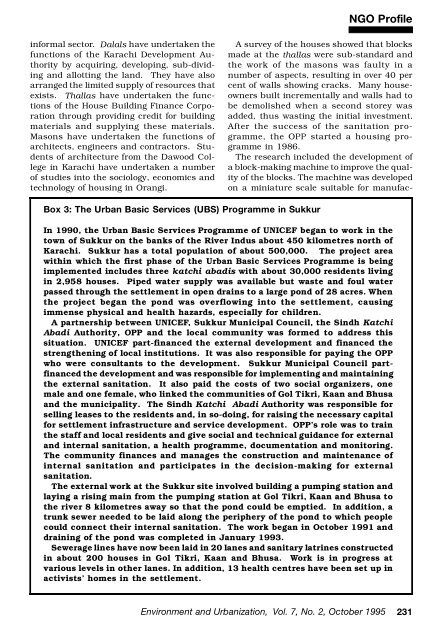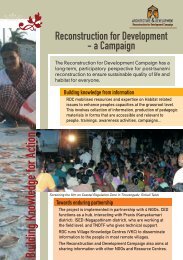Orangi Pilot Project
Orangi Pilot Project
Orangi Pilot Project
Create successful ePaper yourself
Turn your PDF publications into a flip-book with our unique Google optimized e-Paper software.
NGO Profile<br />
informal sector. Dalals have undertaken the<br />
functions of the Karachi Development Authority<br />
by acquiring, developing, sub-dividing<br />
and allotting the land. They have also<br />
arranged the limited supply of resources that<br />
exists. Thallas have undertaken the functions<br />
of the House Building Finance Corporation<br />
through providing credit for building<br />
materials and supplying these materials.<br />
Masons have undertaken the functions of<br />
architects, engineers and contractors. Students<br />
of architecture from the Dawood College<br />
in Karachi have undertaken a number<br />
of studies into the sociology, economics and<br />
technology of housing in <strong>Orangi</strong>.<br />
A survey of the houses showed that blocks<br />
made at the thallas were sub-standard and<br />
the work of the masons was faulty in a<br />
number of aspects, resulting in over 40 per<br />
cent of walls showing cracks. Many houseowners<br />
built incrementally and walls had to<br />
be demolished when a second storey was<br />
added, thus wasting the initial investment.<br />
After the success of the sanitation programme,<br />
the OPP started a housing programme<br />
in 1986.<br />
The research included the development of<br />
a block-making machine to improve the quality<br />
of the blocks. The machine was developed<br />
on a miniature scale suitable for manufac-<br />
Box 3: The Urban Basic Services (UBS) Programme in Sukkur<br />
In 1990, the Urban Basic Services Programme of UNICEF began to work in the<br />
town of Sukkur on the banks of the River Indus about 450 kilometres north of<br />
Karachi. Sukkur has a total population of about 500,000. The project area<br />
within which the first phase of the Urban Basic Services Programme is being<br />
implemented includes three katchi abadis with about 30,000 residents living<br />
in 2,958 houses. Piped water supply was available but waste and foul water<br />
passed through the settlement in open drains to a large pond of 28 acres. When<br />
the project began the pond was overflowing into the settlement, causing<br />
immense physical and health hazards, especially for children.<br />
A partnership between UNICEF, Sukkur Municipal Council, the Sindh Katchi<br />
Abadi Authority, OPP and the local community was formed to address this<br />
situation. UNICEF part-financed the external development and financed the<br />
strengthening of local institutions. It was also responsible for paying the OPP<br />
who were consultants to the development. Sukkur Municipal Council partfinanced<br />
the development and was responsible for implementing and maintaining<br />
the external sanitation. It also paid the costs of two social organizers, one<br />
male and one female, who linked the communities of Gol Tikri, Kaan and Bhusa<br />
and the municipality. The Sindh Katchi Abadi Authority was responsible for<br />
selling leases to the residents and, in so-doing, for raising the necessary capital<br />
for settlement infrastructure and service development. OPP’s role was to train<br />
the staff and local residents and give social and technical guidance for external<br />
and internal sanitation, a health programme, documentation and monitoring.<br />
The community finances and manages the construction and maintenance of<br />
internal sanitation and participates in the decision-making for external<br />
sanitation.<br />
The external work at the Sukkur site involved building a pumping station and<br />
laying a rising main from the pumping station at Gol Tikri, Kaan and Bhusa to<br />
the river 8 kilometres away so that the pond could be emptied. In addition, a<br />
trunk sewer needed to be laid along the periphery of the pond to which people<br />
could connect their internal sanitation. The work began in October 1991 and<br />
draining of the pond was completed in January 1993.<br />
Sewerage lines have now been laid in 20 lanes and sanitary latrines constructed<br />
in about 200 houses in Gol Tikri, Kaan and Bhusa. Work is in progress at<br />
various levels in other lanes. In addition, 13 health centres have been set up in<br />
activists’ homes in the settlement.<br />
Environment and Urbanization, Vol. 7, No. 2, October 1995 231




